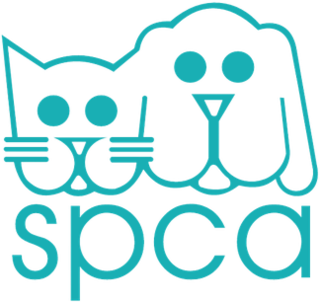The American Society for the Prevention of Cruelty to Animals (ASPCA) is a non-profit organization dedicated to preventing animal cruelty. Based in New York City since its inception in 1866, the organization's mission is "to provide effective means for the prevention of cruelty to animals throughout the United States."

A humane society is a group that aims to stop cruelty to animals. In many countries, the term is used mostly for societies for the prevention of cruelty to animals (SPCA). In the United Kingdom, and historically in the United States, such societies provide waterway rescue, prevention and recovery services, or may give awards for saving human life.

The Royal Society for the Prevention of Cruelty to Animals (RSPCA) is a charity operating in England and Wales which promotes animal welfare.

An animal control service or animal control agency is an entity charged with responding to requests for help with animals, including wild animals, dangerous animals, and animals in distress. An individual who works for such an entity was once known as a dog catcher, but is generally now called an animal control officer, and may be an employee or a contractor – commonly employed by a municipality, county, shire, or other subnational government area.
A Society for the Prevention of Cruelty to Animals (SPCA) is a common name for non-profit animal welfare organizations around the world. The oldest SPCA organization is the Royal Society for the Prevention of Cruelty to Animals, which was founded in England in 1824. SPCA organizations operate independently of each other and campaign for animal welfare, assist in the prevention of cruelty to animals cases.

Cruelty to animals, also called animal abuse, animal neglect or animal cruelty, is the infliction by omission (neglect) or by commission by humans of suffering or harm upon non-human animals. More narrowly, it can be the causing of harm or suffering for specific achievements, such as killing animals for entertainment; cruelty to animals sometimes encompasses inflicting harm or suffering as an end in itself, referred to as zoosadism.
The Scottish Society for the Prevention of Cruelty to Animals is a charity to promote animal welfare in Scotland.

Theresa Gattung is a New Zealand businessperson and the former chief executive of Telecom New Zealand (1993–2007).

The Society for the Prevention of Cruelty to Animals, Selangor is a non-profit animal shelter in Selangor, Malaysia. The SPCA Selangor was founded by Ruth Spiers in 1958.

The Society for the Prevention of Cruelty to Animals is a registered charity to promote animal welfare in Hong Kong, with outreach services to China.
RSPCA Australia is an Australian peak organisation established in 1981 to promote animal welfare. Each state and territory of Australia has an RSPCA organisation that predates and is affiliated with RSPCA Australia.

Clyde Leonard Carr was a New Zealand politician of the Labour Party, and was a minister of the Congregational Church.
Zimbabwe Society for the Prevention of Cruelty to Animals is a non-profit organization dedicated to preventing the abuse of animals.

Caroline White was an American philanthropist and anti-vivisection activist. She co-founded the Pennsylvania Society for the Prevention of Cruelty to Animals (PSPCA) in 1867, founded its women's branch (WPSPCA) in 1869, and founded the American Anti-Vivisection Society (AAVS) in 1883.

Cats are a popular pet in New Zealand. Cat ownership is occasionally raised as a controversial conservation issue due to the predation of endangered species, such as birds and lizards, by feral cats.

Animal welfare in New Zealand is governed by the Animal Welfare Act 1999 and a number of organisations actively advocate for both animal welfare and animal rights. Pest control and farming practices have been scrutinised with respect to animal welfare issues. The legality of killing dogs and cats for consumption has also been criticized.
RSPCA NSW is a not-for-profit charity operating in New South Wales, Australia that promotes animal welfare.
RSPCA Tasmania is an animal welfare, education and advocacy charitable organisation based in Tasmania, Australia. They run and maintain a shelter facility for the boarding of surrendered and seized animals, as well as operating retail shop fronts for the adoption of pets. They are responsible for the enforcement of state and federal animal welfare laws for domestic animals, and laws relating to non-commercial animal related activities in Tasmania.
The British Columbia Society for the Prevention of Cruelty to Animals is a non-profit animal welfare organization which advocates for animal protection legislation, operates animal shelters, and runs educational workshops and public awareness programs throughout British Columbia, Canada. Founded in 1896, it is a registered charitable organization and one of the largest such animal welfare organizations in North America. As of 2017, BC SPCA had 36 branches, over 500 staff members, nearly 5500 volunteers, operated 5 veterinary hospitals/clinics and a wildlife rehabilitation centre, and sheltered more than 22000 animals. It is also one of the few animal welfare organizations to monitor animals in film.











